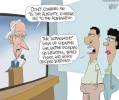Mom’s changing stories about money cause hurt, confusion
After Dad’s death several years ago, Mom married a sweet man she then met. She soon realized he had lots of money and against his wishes or knowledge began letting us kids and others know of her anticipated wealth. He was not in good health and did die two months ago. She misses him, but did begin planning if and how to distribute some of this money. She would tell one of us adult children one idea how to give some to us and another sibling (a different) idea.
A few days ago, she called me in apparent shock that she’d been notified that there is another trust that barely includes her. Today she informed myself (trustee) and my brother (second trustee) that she didn’t want people after her money and made up the story about another trust. So, how do I not let this lying arrogance on her part with this wealth, her shortness with me when my brother is around, drive me crazy? I try to get “outside of it all and observe,” but it’s difficult. She’s in the hospital with health issues since the fake trust story began and called there at 2 a.m. (to say), “I don’t want to die alone.” She just wanted to tell us about her deception. — T., Las Vegas
Couldn’t help but smile a compassionate smile when I read the way you phrased the tightrope dichotomy of trying to be The Observer (detached, staying objective) yet still having the very real human experience of being “driven crazy.” Yes. That’s it exactly. I pronounce you a sane, normal, ordinary human being.
Because it’s always both, isn’t it? We’re not machines. Disingenuous, dishonest behavior is consequential. “Try not to personalize it,” people will cluck at us. But, damn it, it is personal when we are conscripted into someone’s crisis of fear and smallness. It is personal to be deliberately moved about the game board of someone’s life as if we were no more than a lesser chess piece in the contest of ego-defense and self-importance.
It hurts to be treated as a means to an end. The hurt is a sign of our health — our self-respect — not a sign that anything about us needs to be fixed.
And yet … it is equally a sign of self-respect that we make an effort to be The Observer. We do this, too, because we love. Despite our hurt and disappointment, we want to try to understand, to attempt to answer the question of what’s really going on here.
She said she “didn’t want people after her money.” My first question for her would be to whom, exactly, does the word “people” refer? Because, as you tell the story, it sure sounds like she’s referring to her children.
Which brings me to my next question: How did she acquire the idea that her children were after her money?
T., I would say your first task is to assess the quality and therefore the capacity of your family relationships. Remember those two words: quality and therefore capacity. Whatever you decide to do should be based on this assessment.
Interpersonal/familial relationships around us have variable quality. Some are deeper than others. Some are more courageous. Some are more trustworthy. More emotionally honest. Some have “normalized” pretense, while others “normalize” authenticity. High quality relationships have great capacity to navigate conflict, mistakes, even moral failure, while lesser quality relationships often just get worse when illuminated and confronted.
Is your adult relationship with your mother of sufficient quality to sit down and ask, point blank, “Where exactly did you get the idea that I (or my brother) were after your money? Because, Mom, when you find yourself spinning cockamamie stories to make sure you’re safe from your children, then I think it’s past time for us to talk.”
Or, if you don’t have this kind of rapport with your mother, then do you have it with your brother? Can you and your brother sit down and craft an intervention for this apparent crisis of your mother’s?
On the other hand, if neither of these relationships is historically strong enough to cope with candor, truth, accountability and emotional honesty, then there isn’t much left for you to do but detach from both of them and do whatever feels to you like the duty of a daughter to her aging mother, letting the chips fall where they may regarding how your mother handles her estate.
I can be in a relationship with you, or I can manage you in relationship. I prefer to do the former. But, if you absolutely insist, you can make me do the latter. I’ll be disappointed, but I’ll do it. Especially if the alternative is being driven crazy.
Steven Kalas is a behavioral health consultant and counselor at Las Vegas Psychiatry and the author of “Human Matters: Wise and Witty Counsel on Relationships, Parenting, Grief and Doing the Right Thing” (Stephens Press). His columns appear on Sundays. Contact him at 227-4165 or skalas@reviewjournal.com.


















